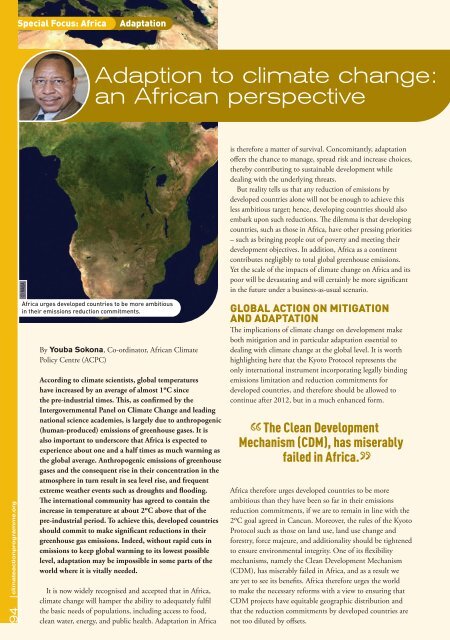Climate Action 2011-2012
You also want an ePaper? Increase the reach of your titles
YUMPU automatically turns print PDFs into web optimized ePapers that Google loves.
Special Focus: africa<br />
adaptation<br />
Adaption to climate change:<br />
an African perspective<br />
94 climateactionprogramme.org<br />
© NASA<br />
Africa urges developed countries to be more ambitious<br />
in their emissions reduction commitments.<br />
By Youba Sokona, Co-ordinator, African <strong>Climate</strong><br />
Policy Centre (ACPC)<br />
According to climate scientists, global temperatures<br />
have increased by an average of almost 1ºC since<br />
the pre-industrial times. This, as confirmed by the<br />
Intergovernmental Panel on <strong>Climate</strong> Change and leading<br />
national science academies, is largely due to anthropogenic<br />
(human-produced) emissions of greenhouse gases. It is<br />
also important to underscore that Africa is expected to<br />
experience about one and a half times as much warming as<br />
the global average. Anthropogenic emissions of greenhouse<br />
gases and the consequent rise in their concentration in the<br />
atmosphere in turn result in sea level rise, and frequent<br />
extreme weather events such as droughts and flooding.<br />
The international community has agreed to contain the<br />
increase in temperature at about 2ºC above that of the<br />
pre-industrial period. To achieve this, developed countries<br />
should commit to make significant reductions in their<br />
greenhouse gas emissions. Indeed, without rapid cuts in<br />
emissions to keep global warming to its lowest possible<br />
level, adaptation may be impossible in some parts of the<br />
world where it is vitally needed.<br />
It is now widely recognised and accepted that in Africa,<br />
climate change will hamper the ability to adequately fulfil<br />
the basic needs of populations, including access to food,<br />
clean water, energy, and public health. Adaptation in Africa<br />
is therefore a matter of survival. Concomitantly, adaptation<br />
offers the chance to manage, spread risk and increase choices,<br />
thereby contributing to sustainable development while<br />
dealing with the underlying threats.<br />
But reality tells us that any reduction of emissions by<br />
developed countries alone will not be enough to achieve this<br />
less ambitious target; hence, developing countries should also<br />
embark upon such reductions. The dilemma is that developing<br />
countries, such as those in Africa, have other pressing priorities<br />
– such as bringing people out of poverty and meeting their<br />
development objectives. In addition, Africa as a continent<br />
contributes negligibly to total global greenhouse emissions.<br />
Yet the scale of the impacts of climate change on Africa and its<br />
poor will be devastating and will certainly be more significant<br />
in the future under a business-as-usual scenario.<br />
Global action on mitiGation<br />
and adaptation<br />
The implications of climate change on development make<br />
both mitigation and in particular adaptation essential to<br />
dealing with climate change at the global level. It is worth<br />
highlighting here that the Kyoto Protocol represents the<br />
only international instrument incorporating legally binding<br />
emissions limitation and reduction commitments for<br />
developed countries, and therefore should be allowed to<br />
continue after <strong>2012</strong>, but in a much enhanced form.<br />
The Clean Development<br />
Mechanism (CDM), has miserably<br />
failed in Africa.<br />
Africa therefore urges developed countries to be more<br />
ambitious than they have been so far in their emissions<br />
reduction commitments, if we are to remain in line with the<br />
2ºC goal agreed in Cancun. Moreover, the rules of the Kyoto<br />
Protocol such as those on land use, land use change and<br />
forestry, force majeure, and additionality should be tightened<br />
to ensure environmental integrity. One of its flexibility<br />
mechanisms, namely the Clean Development Mechanism<br />
(CDM), has miserably failed in Africa, and as a result we<br />
are yet to see its benefits. Africa therefore urges the world<br />
to make the necessary reforms with a view to ensuring that<br />
CDM projects have equitable geographic distribution and<br />
that the reduction commitments by developed countries are<br />
not too diluted by offsets.












